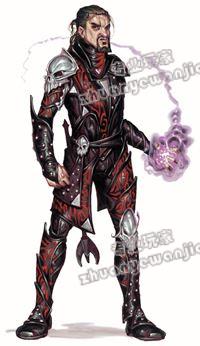美服《龙与地下城》邪术师浅析 解读其与法师&术士的区别
上周,我们谈论了术士的相关事宜,本周,我们来看看邪术师。
跟术士一样,从游戏测试中得到的反馈表明,玩家喜欢该职业的某些部分,但对其与之前版本之间的联系不是很密切而感到失望。于是,我么回顾了之前两个版本以及第三版的魔法全书,以此作为我们的职业设计依据。在其最后的版本中,邪术师综合了第四版和第三版中的某些概念。
邪术师与赞助人签订契约,赞助人会赠与邪术师有限的魔法力量,比术士或法师都要少得多。 然而,邪术师也有与生俱来的魔法能力——魔焰异变。邪术师可通过这些异变获得独特的魔力,使用特定的法术。异变是邪术师魔力的典型代表。你可以把它们看作咒语或专长,邪术师可以次又一次地使用这些力量。
与其他施法者相比,邪术师的施法方式稍微有些不同。邪术师每天都会得到一些法术,但所有这些法术的施展等级必须跟邪术师的等级保持一致。高等级邪术师的法术要比同等级的法师少一些,但这些法术的效力同样也很高。除了从其赞助人那里获得法术,邪术师也可以从法术列表中选择法术。

邪术师选择与一位赞助人签订契约,赋予角色独特的能力。签订的剑之契约可以让他打造出一把纯魔法的剑,在战斗中使用。链之协议会带来某些生物,夸塞魔或伪龙供其差遣。书之契约可以给邪术师带来更高深的神秘力量。邪术师可以任意与赞助人签订这三种契约。有些邪恶变异可以增强邪术师的契约能力。
在战斗中,邪术师比术士和法师都要持久,可以跟牧师和盗贼比肩。邪术师是独行侠和流浪者,很多都学会了不使用魔法就能生存的能力。他们可以获得轻甲和简单的武器。
看着D&D中的三个施法者——法师,邪术师和术士,你可以发现一个趋势。作为魔法学徒,法师具有最高的魔法使用灵活度;他们掌握更多的法术,可以准备一个大范围的法术。当面对某个特定目标的情况下,法师有能够使用出最佳的魔法。
术士在法术较少的专家,但能够将法术进行塑造和放大,是其更有效果。当面对特定情况或挑战,术士可以施展适应该挑战的法术。
尽管邪术师没有法师和术士灵活,但他们施法能力与独特的技巧给予他们一定的优势。邪术师面对具体情况并不担心手头有没有合适的法术,而是使用职业的独特的功能和先进的施法能力克服任何挑战。专业玩家比价器为外服游戏担保比价和担保交易。
原文
Warlock Update
Last week, we rolled out some information on the sorcerer. This week, we talk about the warlock in D&D Next.
As with the sorcerer, our initial playtest feedback on the warlock showed that players liked some parts of the class's presentation but were disappointed that it didn't have stronger ties to its previous incarnations. We thus went back to the two earlier versions of the warlock, along with the binder from 3rd Edition's Tome of Magic, for the design of this class. In its final incarnation, the warlock blends some of the concepts of the 4th Edition and 3rd Edition warlock. It also incorporates concepts from the binder that influenced the warlock's 4e design.
A warlock forges a pact with an otherworldly patron. That patron grants the warlock magical power in the form of a limited number of spells—far fewer than either the sorcerer or the wizard. However, a warlock also gains a number of innate magical abilities called eldritch invocations. These invocations allow a warlock to cast spells as rituals, to gain unique magical powers, and to use specific spells at will. Invocations are the warlock's signature magical ability. You can think of them as cantrips or feats on steroids—powerful abilities that a warlock can use again and again.
A warlock uses spells in a slightly different manner than other arcane casters. The warlock gains a small number of spells per day, but all those spells are cast at a spell slot level determined by the warlock's level. A high-level warlock casts fewer spells than a wizard of the same level, but each of those spells is cast at a heightened level of potency. Warlocks select spells from the class's spell list, in addition to gaining bonus spells based on the entity with which they forge a pact.
A warlock chooses to forge one of three pacts with an otherworldly patron, granting the character a unique set of abilities. The pact of the blade allows a warlock to create a weapon of pure magic to wield in battle. The pact of the chain pledges a creature such as a quasit or a pseudodragon to the warlock's service. The pact of the tome grants the warlock access to deeper arcane power. A warlock can choose to match any of these three pacts to any type of patron. Some eldritch invocations augment a warlock's pact abilities.
More durable than sorcerers and wizards, warlocks are on a par with clerics and rogues in combat. As loners and outcasts, many warlocks have learned to survive without the overt use of magic, and they have access to light armor and simple weapons.
When looking at D&D's three arcane casters—the wizard, the warlock, and the sorcerer—you can see a trend emerge. As students of magic, wizards have the most flexibility in how they employ that magic. They master more spells and can prepare a wider range of spells. When faced with a specific situation, a wizard has the best chance of having the right spell for the job.
Sorcerers are specialists who master fewer spells, but who can shape and amplify those spells to make them even more effective. When faced with a specific situation or challenge, a sorcerer twists spells to suit that challenge.
Though warlocks have less flexibility in their spellcasting than wizards or sorcerers, their capacity for supporting their spellcasting with unique tricks and focus gives them an edge. A warlock faced with a specific situation doesn't worry about having the right spell at hand, but instead uses the class's unique features and advanced spellcasting power to overcome any challenge.